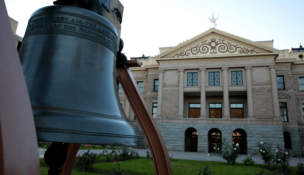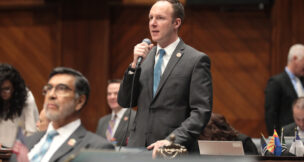High court approves ballot measure on judicial retention
Howard Fischer, Capitol Media Services//August 23, 2024//
High court approves ballot measure on judicial retention
Howard Fischer, Capitol Media Services//August 23, 2024//
The Arizona Supreme Court has cleared the way for voters to decide whether they and most other judges in the state should be allowed to have de facto life terms.
In an order late Thursday, the justices rejected claims that Proposition 137 illegally seeks to amend two separate and unrelated provisions of the Arizona Constitution about judicial elections.
On one hand, if approved, it would eliminate the requirement for judges who are now selected by the governor to have to seek voter approval on a regular basis for new terms. Instead, it would spell out that only a sitting judge who ran into trouble, like a personal bankruptcy, a felony conviction or a sub-par evaluation from the Commission on Judicial Performance Review would have to face voters.
And anyone else could remain on the bench, untouchable by voters, until they reach the mandatory retirement age of 70.
But the measure also would, for the first time ever, allow the majority party in the Legislature to appoint two members to that performance review commission. And it would require the commission to investigate any lawmaker’s complaint of malfeasance against any judge.
Challengers said the issues should be presented to voters as separate questions versus a take-it-or-leave-it approach. But Chief Justice Ann Scott Timmer, writing for the court, said they are sufficiently related to each other to be a single question.
The ruling was unanimous – at least of the five justices who heard the arguments.
Justices Clint Bolick and Kathryn King recused themselves from participating.
But while the future of Proposition 137 would affect all sitting justices, they had what could be considered the most direct interest in the future of the measure: Both are up before voters at the Nov. 5 election seeking new six-year terms.
More significant is how the issue was crafted by Sen. David Gowan, R-Sierra Vista.
Put simply, if voters approve Prop 137 on Nov. 5, it would be effective retroactively, to Oct. 31. And that means if the measure is approved, it would negate any separate decision by voters to reject new terms for Bolick or King or both.
Thursday’s ruling sets the stage for a battle, both over the ballot measure and the future of the two justices.
Progress Arizona already has launched an effort to convince voters to turn both Bolick and King out of office as well as to defeat Prop 137. But it is not alone.
The National Democratic Redistricting Commission and Planned Parenthood Votes announced in May they intend to spend at least $5 million on supreme court races across the country, with a focus on six states, including Arizona. The reason, they said, is that those courts are crucial to determining whether abortion rights stay in place after the U.S. Supreme Court overturned Roe v. Wade in 2022.
Bolick and King, both appointed by Republican Doug Ducey when he was governor, provided two of the four votes on the court earlier this year that ruled an 1864 law outlawing abortion except to save the life of the mother trumped a 2022 law allowing the procedure until the 15th week.
State lawmakers have since voted to repeal the old law. And no changes on the court now would overturn the decision.
But if the pair were turned out of office, that would give Democratic Gov. Katie Hobbs, an abortion rights advocate, a chance to replace them with her own choices.
On the other side, conservative political activist Randy Kendrick launched the Judicial Independence Defense PAC, putting up $100,000 of her own money of the $140,000 raised to convince voters specifically to retain the sitting justices. And she had her own take on what would happen if Hobbs got to select their replacements as well as that of Robert Brutinel who, at 66, is four years away from mandatory retirement.
“It matters because the Arizona Supreme Court is our last line of defense against liberal government overreach,” she wrote in a fundraising appeal.
If approved, Prop 137 would be a major shift in what is known as the “merit selection” process for judges.
Until 1974, all judges at all levels were elected, just like politicians.
That year voters approved a system where the governor selects members of the Supreme Court, the Court of Appeals and the superior court judges in the larger counties. That list now includes Pima, Pinal, Coconino and Maricopa.
The governor’s picks, however, are limited, with the choices needing to come from a list of nominees from special screening panels.
Once on the bench, they are subject to regular voter review of four years for superior courts and six years for appellate-level court. If turned out, the process starts over again.
Proponents say the system is too cumbersome, with upwards of 50 judges appearing on ballots in some counties. And, in most cases, they all have been returned to the bench.
But there’s also the fact that judges can face opposition over unpopular decisions, pretty much what is happening now with the targeting of Bolick and King.
That has led to another group that is weighing in.
Attorney Tim Berg who chairs Arizonans for an Independent Judiciary said its goal is not specifically to keep either Bolick or King on the bench but instead to educate people about the merit selection and retention process. And that, he said, means convincing voters that their choices should not be made based on whether they are happy with one or two decisions.
But Abigail Jackson, spokeswoman for Progress Arizona, said voters should have their say on judges, even if opposition is based on a single decision like the one on abortion.
“Voters across the board are angry about this ruling,” Jackson said in launching the effort to oust the pair. “If Arizona voters want to use the power that the constitution gives them to hold them accountable, and their main concern is this ruling, then I think voters are within their rights and power to do so.”
In agreeing Thursday to put Prop 137 on the ballot, the justices did not get into any of that.
The only question was whether it meets the legal standards to go to the ballot. And Timmer said it does not violate restrictions on placing separate issues into a single all-or-nothing measure.
“(Prop 137) complies with the separate amendment rule because its provisions are topically related and sufficiently interrelated so as to form a consistent and workable proposition that, logically speaking, should stand or fall as a whole,” Timmer wrote.










































